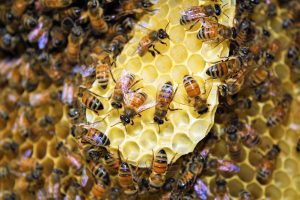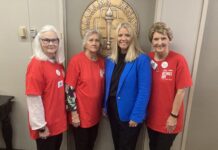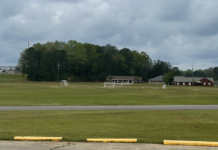
By William Rowe
The 27th Annual Alabama Beekeeping Symposium is digital again! Because of the current COVID-19 Omicron spread, participants will be able to attend this year’s symposium from the comfort of their own home.
What to Expect
The symposium is a two-day online event, running February 5 and 6. There is a $20 fee to attend. The symposium includes many presentations that deal with the latest information on sound beekeeping practices. This year, the symposium will focus on three topics that most affect Alabama beekeepers: queens, mites, and nutrition. These three topics alone account for most yearly losses.
Saturday, February 5 Agenda
Start Time – 8:25 a.m.
Joint Session
- Fight the Mite Thailand Edition: Understanding the Mysterious Tropilaelaps Mite – Samuel Ramsey
- Introduction to the Conference Theme – Geoffrey Williams
After the joint session, participants can choose which breakout sessions they would like to attend. They can either choose to attend all the sessions from one particular track or pick and choose sessions from both tracks.
Honey Bee Forage and Nutrition
- High Impact Planting for Bees – Jimmy Gatt, Georgia Master Beekeepers
- Establishing A Wildflower Meadow – Anthony Abbate, Auburn University Pollinator Lab
- Bee Friendly Landscapes – Dani Carroll, Alabama Cooperative Extension System, Home Grounds
Queens and Mites
- The Honey Bee Queen: Our Royal Highness
- Sneak Preview: An Upcoming Experiment on Varroa Mite Management in Spring Splits – Dan Aurell, Auburn University Pollinator Lab
- City Bee – Olivia Fuller, Alabama Cooperative Extension System, Commercial Horticulture
Return to Joint Session
- After The Fat: Current Research Endeavors to Fight the Mite – Samuel Ramsey
- Survey and Evaluation
Sunday, February 6 Agenda
Start Time – 2 p.m.
Joint Session
- The Many Facets of Honey Bee Nutrition – Priyadarshini Chakrabarti Basu
After the joint session, participants can choose which breakout sessions they would like to attend. They can either choose to attend all the sessions from one particular track or pick and choose sessions from both tracks.
Honey Bee Forage and Nutrition
- Bee Informed Partnership – Geoffrey Williams, president, Bee Informed Partnership
- Alabama Apiary Inspection 2021 – Philip Carter
Queens and Mites / Journey To Mastery
- Effects of Agro-chemicals Found in Wax on the Reproductive Quality of Honey Bee Queens – Juliana Rangel
- Cell Punch Queen Rearing Method – Wil Montgomery
- Moving A Bee Hive – Stan Bennett, Alabama Journeyman Beekeeper
- TBA – Patrick McCalman, president, Alabama Master Beekeepers
Return To Joint Session
- What We Know About Bee Nutrition: When to Feed and What to Feed – Priyadarshini Chakrabarti Basu
- Survey and Evaluation
Speakers
Guest Professors
- Samuel Ramsey is a research fellow with the USDA Bee Research Laboratory at the Agricultural Research Service. He is the project lead for the Fight the Mite Initiative, which seeks to meet the threat of potentially invasive bee mites with well-researched data. So far, this study has been able to provide critical insight about treatment measures that can be used effectively against parasitic mites of honey bees, which are currently expanding their geographic range and economic impact. His passion for research and science communication has lead to international recognition and no shortage of press engagement. Ramsey works to use that excitement and interest around his research projects to promote greater diversity in STEM and greater engagement of the public with the scientific process.
- Priyadarshini Chakrabarti Basu is currently an assistant professor at Mississippi State University in the department of biochemistry, molecular biology, entomology and plant pathology and holds a courtesy faculty appointment in the Oregon State University department of horticulture. She was a former research associate in the Sagili Honey Bee Lab at Oregon State University. Chakrabarti Basu is working on all things bees including nutrition, physiology, toxicology, molecular ecology, functional biology and neuroethology using a wide array of multidisciplinary techniques including multiomics. She is currently the vice-chair of the Early Career Professional Committee (ECP) of the Entomological Society of America, serving as the Physiology, Biochemistry and Toxicology section representative to the ECP committee. She also chairs the Outstanding ECP Series committee on Entomology Today. Chakrabarti Basu’s chief foci include all three aspects of research, teaching, and extension to help protect bee pollinators, strategize mitigative measures to counteract the various stressors affecting bee pollinators, and working with the community, policy makers, researchers and stakeholders to promote bee pollinator awareness. More information can be found at http://priyadarshinichakrabarti.com/.
- Juliana Rangel is an associate professor of apiculture at Texas A&M University. Born in Colombia, South America, Rangel obtained a B.S. in ecology, behavior, and evolution in 2014 from the University of California, San Diego. In 2010, she obtained a Ph. D. in neurobiology and behavior from Cornell University in Ithaca, New York. She was a National Science Foundation postdoctoral research fellow from 2010 to 2013 working with David Tarpy at North Carolina State University. In January 2013, Rangel became assistant professor of apiculture in the department of entomology at Texas A&M University. She is an active member of the Texas Beekeepers Association and has spoken to dozens of beekeeping associations across the United States and internationally. She teaches the courses Honey Bee Biology, Introduction to Beekeeping, and Professional Grant and Contract Writing.
Auburn University Professors and Graduate Researchers
- Geoffrey Williams is from western Canada, did scientific training in eastern Canada, and has worked with honey bees throughout North America, Europe, and Asia. Now at Auburn University, He now directs a program that seeks to better understand and promote bee health. To achieve these massive goals, the Auburn University Bee Lab is working on various topics including
- studying the effects of neonicotinoids on queens,
- working on the latest integrated pest management tool against varroa
- performing the Bee Informed Partnership’s National Colony Loss and Management Survey
- investigating bee attractiveness to native wildflowers
“In addition to working with students on their projects, one aspect of my work that I really enjoy is discussing with beekeepers – the reasons why you love beekeeping, why you keep bees, and what challenges you most about beekeeping,” Williams said. “I’m excited to spend some time with you all this year, albeit virtually. See you soon!”
- Anthony Abbate obtained a master’s degree in entomology at the University of Florida and recently graduated this spring with a doctorate degree in entomology from Auburn University. Abbate is currently working as a postdoctoral researcher at the Auburn University Bee Lab. Their research focuses on assessing how natural and anthropogenic disturbances affect native pollinators, crop pollination, and native wildflower establishment and pollination.
- Dan Aurell is a graduate student at Auburn University, working in the bee lab under Williams. He is interested in developing improved methods of Varroa control, as well as researching other efficient management interventions to improve colony health and survival.
- Selina Bruckner grew up in a small village in Switzerland where she extracted her first honey and found an interest in bees. Currently, she is a PhD at Auburn University studying potential combined effects of Varroa mites and neonicotinoids on honey bee health.
Alabama Cooperative Extension System Speakers
- Dani Carroll has been with Alabama Extension for 18 years with home grounds. She has kept bees, loves to garden, ramble in the woods, and play with her dogs. She is one of the founding members of the Saugahatchee Beekeepers Association and currently resides in Lee County, Alabama.
Guest Beekeepers
- Jimmy Gatt is a Georgia Journeyman beekeeper and the vice president of the Metro Atlanta Beekeepers Association. He enjoys public speaking to beekeeping and gardening groups about high-value nectiferous plants for honey bees and native bees. He is a Trees Atlanta TreeKeeper and volunteers with Trees Atlanta to help plant melliferous trees and serve as a honey bee resource. He works as a software developer and lives in Marietta, Georgia.
Alabama Apiary Inspection Unit
- Philip Carter currently serves as an apiary inspector with Alabama Department of Agriculture and Industries. His work involves maintaining surveillance of the beekeeping industry for the detection and prevention of honeybee pests and diseases.
Alabama Master Beekeepers
- Patrick McCalman is a native of south Alabama and manages between 50 and 75 colonies in southern Covington County. He became an Alabama Master Beekeeper in 2019. He lives in Andalusia with his wife–Valarie–two sons–Cal and Jack–and a dog named Honey.
- Stan Bennett is a native of and a lifelong resident of Anniston, Alabama. He is a Master Gardener focusing on vegetables and flowers, which sparked his interest in honey bee behavior and pollination. He has been an apiarist for the last seven years. This is his fourth year as the secretary of the Northeast Alabama Beekeepers Association. He has been married to his wife, LaNita, for forty-one years.When he is not in the garden or with his bees or with his family, he is on the river fishing.
More Information
Recordings of each presentation will be available for registered attendees for two weeks after the symposium. For more information on the 27th Annual Alabama Beekeeping Symposium, contact William Rowe at wjr0001@auburn.edu or (251) 589-5572.
















